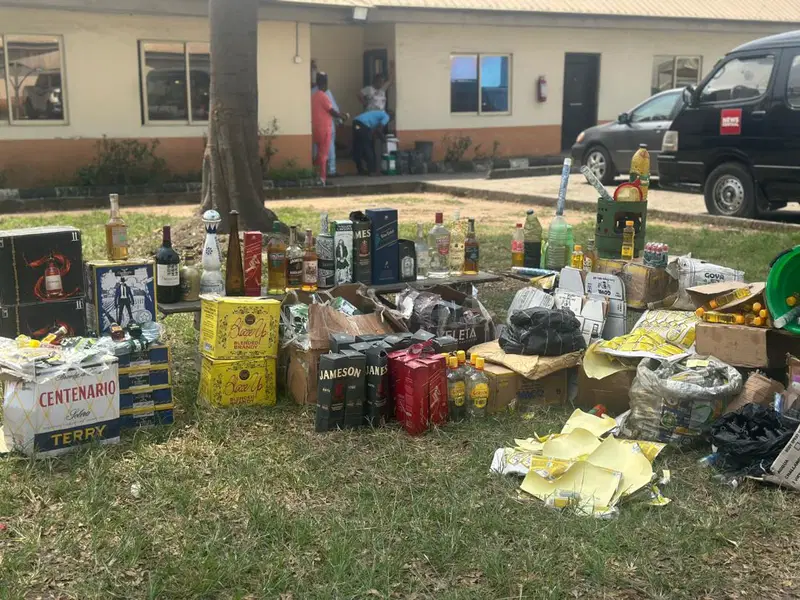Operatives of the National Agency for Food and Drug Administration and Control (NAFDAC) have uncovered an illegal factory producing fake Goya oil in Lagos.
The agency also dismantled a major syndicate involved in the counterfeiting of alcoholic drinks in Lagos, warning that the activities pose grave dangers to public health.
Martins Iluyomade, Director of Investigation and Enforcement at NAFDAC and Chairman of the Federal Task Force on Fake and Substandard Products, said the discoveries were made during surveillance and enforcement operations carried out over the past few weeks.
“We have carried out a couple of activities in recent weeks, and what we discovered was very surprising to us. We felt it was important to speak with Nigerians so they can know what has been going on,” Iluyomade said.
He disclosed that NAFDAC operatives uncovered an illegal operation inside Oke-Arin market, Lagos, where counterfeit Goya oil was being produced locally.
“The original Goya oil is imported into this country through a reputable company, and there are still original products in circulation. But we discovered that some people were faking this product and manufacturing it inside the market,” he said.
According to Iluyomade, the fake oil was produced by burning palm oil and adding chlorine, using crude equipment like stove.
“They were using a stove. We saw the stove and everything they were using. We also saw a large number of empty bottles they were refilling and repackaging,” he added.
Iluyomade warned Nigerians, particularly, churches and prayer houses, stressing that original Goya oil is never packaged in plastic (PET) bottles.
“Let me say this clearly to everybody—churches, prayer houses, and anywhere this oil is used: there is no original Goya oil packed in plastic bottles. Original Goya oil comes in glass bottles,” he said.
He urged Nigerians to report anyone selling the product in plastic bottles to the nearest NAFDAC office.
“Anywhere you see Goya oil being sold in PET bottles, report it. People should beware, noting that the use of fake anointing oils in religious settings had become widespread and dangerous.
“Some people even drink anointing oil. You are not drinking anointing oil—you are drinking poison,” Iluyomade said.
The enforcement director explained that NAFDAC’s strategy is to halt production at the source rather than punish unsuspecting traders.
“We are stopping the production. Once there is no new supply, whatever is in the market will dry up,” he said.
“We do not want to compound the problem of market women and others who may not know. But for the producers, it is the end of the road.”
He appealed to religious bodies to cooperate with the agency.
“We are not issuing threats, but it will not be nice for us to arrest people within your premises. Please partner with us and do not allow the sale or use of this product,” he said.
Iluyomade also revealed that NAFDAC had busted a major operation involved in the production of fake alcoholic drinks in Lagos.
“The faking of alcoholic drinks has become seriously endemic in Nigeria because it is one of the easiest products to counterfeit,” he said.
He said a suspect, Mr. Moses Nelson, was arrested in the Badagry area of Lagos and has been charged to court.
“In his house, we found all manner of fake products—virtually every major brand. There was none we did not see,” Iluyomade said.
According to him, the syndicate operated a distribution chain, producing the drinks in Badagry and supplying them to major markets across Lagos.
NAFDAC also warned distributors against patronising unauthorised suppliers.
“You know the original owners of these brands. Why buy from people you know are not the owners just to make more money? In the process, you are killing people,” he cautioned.
He also advised Nigerians to be wary of unusually cheap products.
“If the normal price is five naira and someone offers it at three naira, you should be suspicious. The little money you want to save, I hope you will not spend it in the hospital,” he said.
Stating that no one has the right to endanger the lives of others, Iluyomade appealed to Nigerians engaged in such illegal businesses to desist.
“We are all Nigerians and everyone wants to make ends meet, but no Nigerian has the right to make ends meet at the expense of the health of another Nigerian,” he said.
“No one has the right to make huge profits while increasing the health burden of this country.”
He assured Nigerians that NAFDAC would sustain enforcement actions nationwide and urged the public to stop patronising counterfeit products and report suspicious activities to the agency.


 Privacy5 years ago
Privacy5 years ago
 News5 years ago
News5 years ago
 Entertainment4 years ago
Entertainment4 years ago
 News5 years ago
News5 years ago
 Opinion5 years ago
Opinion5 years ago
 News5 years ago
News5 years ago
 Sports4 years ago
Sports4 years ago
 Entertainment4 years ago
Entertainment4 years ago












